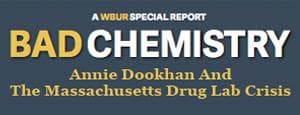Advertisement
Mass. Reeling From Drug Lab Scandal A Year Later
The state is still reeling a year after a scandal at a drug lab threw the legal system into turmoil: More than 330 prison inmates have been released from custody and at least 1,1000 cases have been dismissed or not prosecuted because of tainted evidence and other fallout from the facility's closure.

Annie Dookhan stands accused of faking test results, tampering with evidence and routinely ignoring testing protocols.
With thousands of challenges still making their way through the court system, many in the legal community believe it will be years before the cases handled by Dookhan are cleared.
Just two weeks ago, a lawyer appointed by Gov. Deval Patrick to help create a database of Dookhan's cases said more than 40,000 defendants may have been affected, about 6,000 more than officials first estimated.
"Forget having your day in court, forget having a lawyer - it's taken us this long just to get a number on the number of cases that she tested," said Matthew Segal, legal director of the American Civil Liberties Union of Massachusetts.
"It's been very damaging to the integrity of the justice system," he said.
Dookhan, 35, treasured her reputation as the most productive chemist in the lab and became the go-to person for prosecutors in drug cases.
But now prosecutors believe Dookhan's reputation was based on fraud. She told state police that instead of testing all the substances turned over to the Department of Public Health lab, she sometimes would test only a fraction of them but certify them all as drugs, authorities said. She has pleaded not guilty and her lawyer hasn't responded to repeated requests for comment.
The scandal led to the resignation of the state's public health commissioner, the resignation of a manager at the lab and the firing of another manager.
Advertisement
The effects have reverberated throughout the state.
The state's public defender says the number of affected cases could be even higher because management and protocol lapses at the lab may have allowed other chemists to cut corners or falsify results. Defense attorneys say all test results at the lab over the last decade should be questioned.
In Suffolk County, which includes Boston, 240 defendants have been released by judges who agreed to put their sentences on hold or reduce their bail for pending cases. About 60 of those released have since been arrested on new charges.
In one case, a career criminal and convicted rapist failed to show up for court after his bail was reduced. Marcus Pixley was rearrested two days later, but his case was cited by prosecutors who feared that dangerous criminals would end up back on the streets. Pixley eventually pleaded guilty to a drug distribution charge and was sentenced to a year in county jail.
In Brockton, the dire consequences predicted by prosecutors came true, authorities said, when a man released from prison early killed another man in a fight over drugs and a gun.
Donta Hood, 22, has since pleaded not guilty in the shooting death of Charles Evans, 45. Hood's lawyer said all defendants are entitled to a review of their cases when improprieties or tainted evidence is discovered.
Hood had served about three years of a five-year sentence on a cocaine distribution charge when prosecutors learned that Dookhan testified about drug evidence at his trial. His case was dismissed and he was released. The remaining evidence had been destroyed because Hood had lost all his appeals, said Plymouth District Attorney Tim Cruz.
Evans' mother, Lucille, said her son had been trying to get his life on track after being released from prison in 2010.
"I'm a little disappointed in what happened at the lab and I'm disappointed with the court that let (Hood) walk out," she said. "Maybe he wouldn't be part of killing my son if he had been kept in jail to do his time."
Two other men who were released ended up getting killed in Brockton. Another man whose drug possession case was dismissed was rearrested after authorities say he shot at state police troopers in a gang unit.
"These individuals deal drugs; they protect their turf with weapons. Once they were released, they went right back to what they know best - dealing drugs - and as a result, we're seeing our violence going up in the city of Brockton," Cruz said.
Some defendants have tried to use their release as a second chance.
Yohan Marquez had served about eight months of a three-year sentence for selling heroin when a judge put his sentence on hold.
Marquez, 36, of Boston, has been out almost a year now but has had trouble finding work. Three weeks ago, he finally landed a job as a prep cook at a Boston restaurant. Less than two weeks later, he was fired.
Marquez said he got a vague response when he asked why, but he believes it's because of the GPS ankle bracelet he wears as a condition of his release, a constant reminder of his criminal record.
Marquez, who had an earlier drug conviction, said he's grateful to be released but disappointed that prosecutors haven't dropped the charges against him because of the accusations against Dookhan.
"I made a mistake. I was paying for my mistake, but you had somebody in the system doing what she was not supposed to do," he said. "That's not my fault."
This program aired on September 1, 2013. The audio for this program is not available.